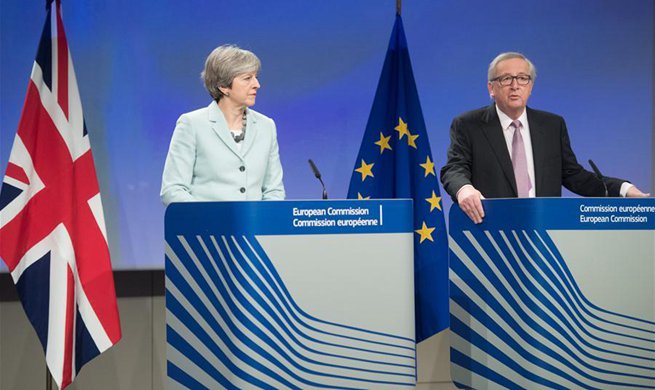BERLIN, Dec. 8 (Xinhua) -- Media and business representatives in Germany have welcomed a breakthrough in Brexit negotiations on Friday while warning that biggest obstacles still lie ahead.
"To be clear: in a potential transition period between 2019 and 2020 London will continue to pay for the privilege of participating in the Single Market, but will no longer be allowed to influence related decisions," the Frankfurter Allgemeine Zeitung (FAZ) wrote.
Several newspapers pointed out that British Prime Minister Theresa May is likely to face resistance from euroskeptic voices back home for agreeing to a compromise which would see Britain practically remain in the European Union (EU) during a transition phase.
German media report that Britain has given in to most of the EU's demands for a "divorce bill" with regards to citizenship rights, the Irish border and a financial settlement worth at least 45 billion euros (52.9 billion U.S. dollars), enabling the conclusion of the first phase of talks and paving the way towards discussions over a future relationship.
However, there were also widespread warnings that the vague wording of the compromise text masked the fact that key issues had merely been postponed rather than solved.
Newspaper Welt noted that policymakers in London had promised to ensure that Northern Ireland would remain "fully-aligned" in regulatory matters with both Britain and the EU while simultaneously emphasizing that their country was leaving both the single market and customs union.
Given the apparent logical contradiction inherent in this stance, Welt said "the problem persists, a clear solution has been delayed again."
Aside from the remaining conundrum posed by the Irish border, FAZ highlighted Britain's departure from the European Atomic Energy Community (Euratom) as an underestimated challenge which will re-surface in phase two of Brexit negotiations.
Britain currently relies on Euratom for its supply of nuclear materials used in medicine and energy generation, as well as for the management of nuclear waste.
Newspaper Sueddeutsche Zeitung also drew attention to the furious reaction of leading euroskeptic Nigel Farage who wrote on twitter that Prime Minister May's deal would only allow Britain to progress to "the next stage of humiliation" as evidence of deep political divisions in Britain.
British Chancellor of the Exchequer Philipp Hammond has recently admitted that May's cabinet has yet to discuss the shape of a future relationship with the EU after "Brexit" due to its contentious nature.
Nevertheless, German business lobbies largely reacted with relief to the news that a transition the second phase of negotiations was now possible.
"The agreement between the EU and Britain is a delayed St. Nicholas gift for the German economy," Eric Schweitzer, president of the German Chambers of Industry and Commerce (DIHK), said.
Schweitzer voiced hope that negotiators would finally begin addressing more urgent questions surrounding tariffs and supply-chains as a result, warning that the "German economy has a lot to lose."
Clemens Fuest, director of the Ifo Institute for Economic Research, similarly described the breakthrough as "very good news,", adding that the EU should next aim to sign a "comprehensive free trade agreement" with Britain to limit the "economic costs of the exit for all sides involved."

















